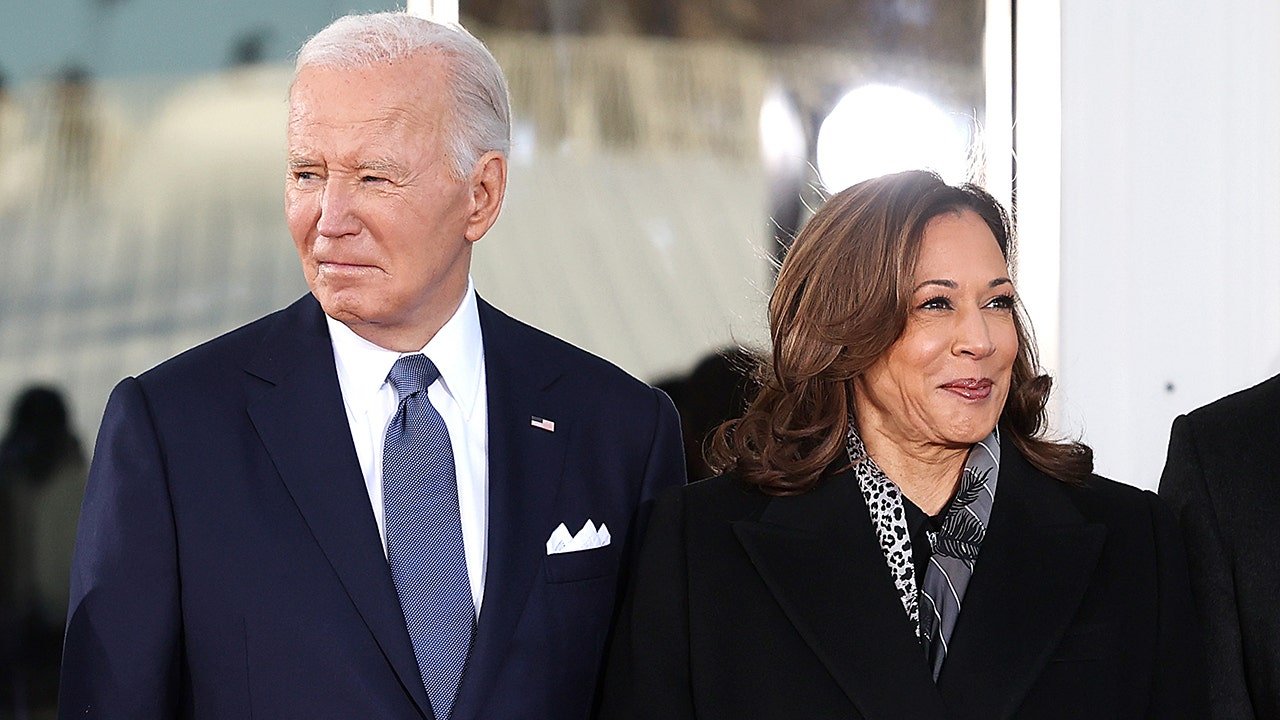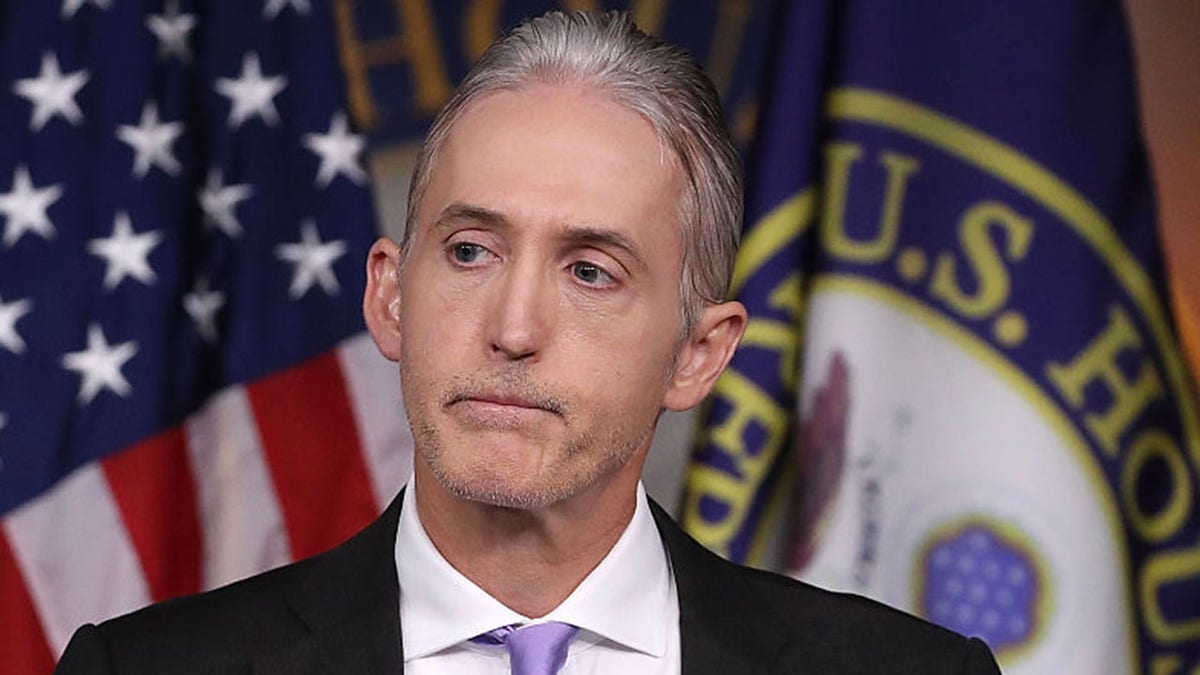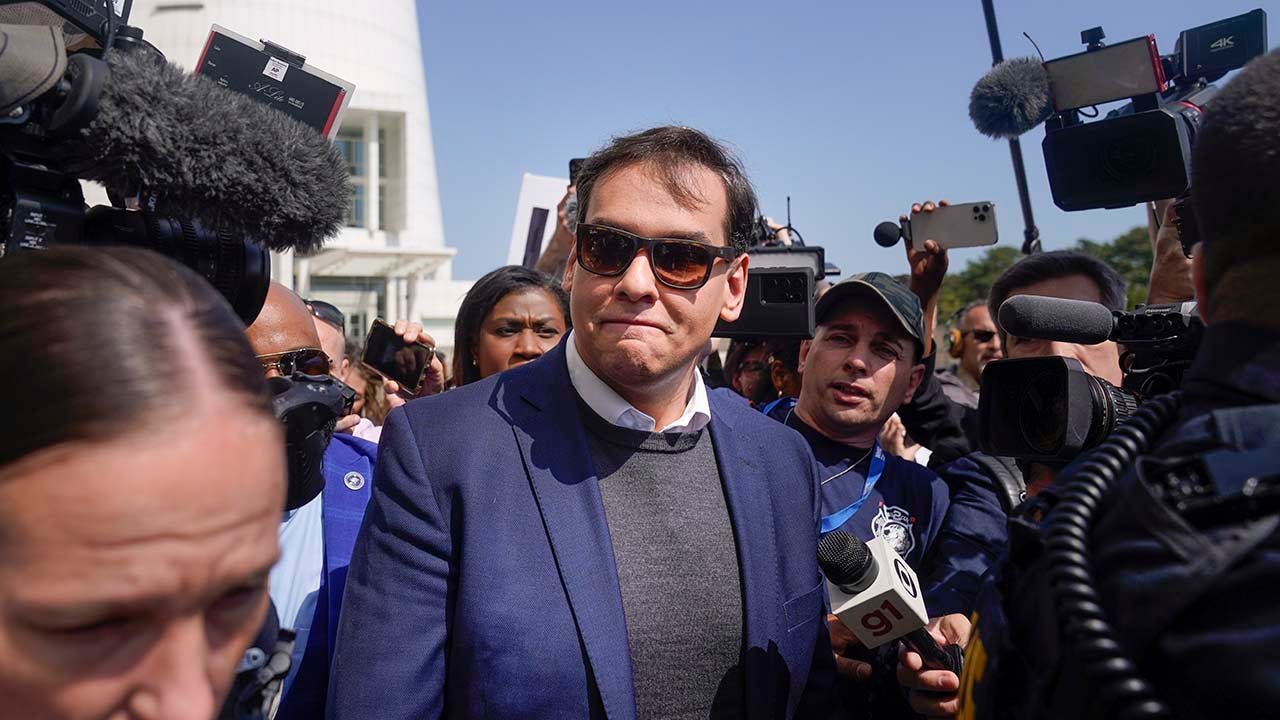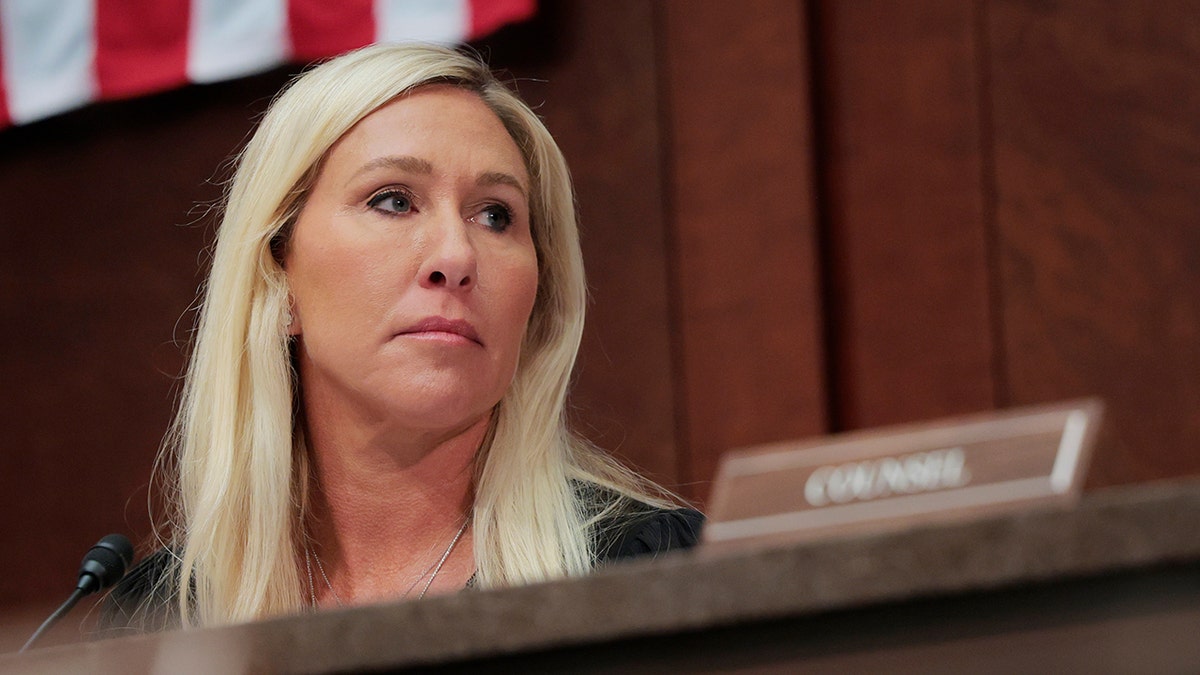INTERNACIONAL
Kamala Harris back in national spotlight as James Comer floats subpoena in Biden ‘cover-up’ probe

NEWYou can now listen to Fox News articles!
Former Vice President Kamala Harris is back in the national spotlight with her forthcoming book about her short-lived 2024 White House campaign, and she is generating a buzz about whether she’ll try again in 2028.
While politicos are keenly watching Harris for her next moves, she’s also being eyed by House Oversight Committee Chair James Comer, R-Ky., who is investigating whether top Biden administration officials covered up evidence of a mental decline in former President Joe Biden.
Comer all but guaranteed his committee would be contacting Harris during an appearance on «The Ingraham Angle» last week. He joined Fox News Channel just after Harris announced she would not be running for governor of California, as some have speculated, and will instead embark on a listening tour to hear from Americans and try to boost fellow Democrats across the country.
«I think that that’s another great thing about Kamala Harris not running for governor – she’s gonna have more time to come before the House Oversight Committee and testify about Joe Biden’s cognitive decline,» Comer said. «So I think that the odds of Kamala Harris getting a subpoena are very high.»
COMER DISMISSES BIDEN DOCTOR’S BID FOR PAUSE IN COVER-UP PROBE: ‘THROWING OUT EVERY EXCUSE’
Former President Joe Biden and former Vice President Kamala Harris stand together at the White House ahead of the inauguration of U.S. President-elect Donald Trump on January 20, 2025, in Washington. (Win McNamee/Getty Images)
During a recent appearance on «The Late Show with Stephen Colbert,» Harris distanced herself from any immediate electoral ambitions. She emphasized she wanted to hear from all voters, however, not necessarily ruling out a future presidential run.
«I believe, and I always believed, that as fragile as our democracy is, our systems would be strong enough to defend our most fundamental principles. And I think right now that, they’re not as strong as they need to be,» Harris said.
«And I just don’t want to for now, I don’t want to go back in the system. I want to, I want to travel the country. I want to listen to people. I want to talk with people. And I don’t want it to be transactional, where I’m asking for their vote.»
RON KLAIN DODGES REPORTERS AFTER MARATHON GRILLING IN BIDEN COVER-UP PROBE
Jonathan Turley, a Fox News contributor and professor at George Washington University Law School, told Fox News Digital the optics of a congressional subpoena would be less than ideal for a potential 2028 candidate.
«This is a tough question for Harris, who clearly has aspirations to run again,» Turley said when asked if he would advise Harris to appear. «The committee can compel her to appear. However, the optics of forcing a subpoena are not exactly optimal for someone who wants to run again for this office.»
He added, however, that Harris would be a «natural» target for Comer’s probe.
«Harris held a unique spot within the inner circle of the White House,» Turley said.
But both he and former House Oversight Committee ChairTrey Gowdy, R-S.C., now a Fox News Channel host, were doubtful that bringing Harris in would yield much new information.

Rep. James Comer, R-Ky., chair of the House Oversight and Accountability Committee, is overseeing a probe into the Biden White House. (Al Drago/Bloomberg via Getty Images)
«Is it worth investigating? Absolutely. Is it worth getting her take on it? Yeah. Is she going to cooperate? No,» Gowdy told Fox News Digital.
The former South Carolina congressman, who also served as a federal prosecutor, predicted that Harris’ lawyers would seek to bury any potential appearance in a quagmire of legal proceedings stemming from executive and/or presidential privilege claims.
«That privilege has been invoked by both parties repeatedly during congressional investigations,» Gowdy said.
«Leaving the names out of it, just for the sake of an analogy, I can’t think of an advisor that would be closer to a president than his or her vice president. So, by the time you’re litigating the issue of whether or not you can compel a vice president to talk about conversations that he or she had with a chief of staff, with a spouse, with the president, with the president’s physician – you’ll be as old as I am by the time that’s litigated.»
Turley said House investigators would have to be armed with «specific» questions to avoid someone like Harris being able to answer with «a matter of opinion.»
Gowdy agreed Harris was a «legitimate» witness to bring in and that the issue of Biden’s autopen use, particularly for pardons, «warrants further scrutiny.»

Trey Gowdy, a former congressman and current Fox News host, said Harris would be a «legitimate» witness. (Mark Wilson/Getty Images)
CLICK HERE TO GET THE FOX NEWS APP
He warned, however, that a potent subpoena comes with consequences for noncompliance.
«Prosecutors can send cops and have [people] brought in. Congress can’t do that. Judges can send the marshals or the sheriff’s deputies out to bring a witness in if the witness is recalcitrant. Congress can’t do that,» Gowdy said. «So your power is only as good as what you can do to enforce it.»
A spokesperson for Biden declined to comment on Comer’s subpoena threat when reached by Fox News Digital.
Spokespeople for Harris and House Oversight Committee Democrats did not return requests for comment.
house of representatives politics,kamala harris,politics,joe biden
INTERNACIONAL
Eduardo Bolsonaro, el hijo «provocador» en el centro del duelo arancelario entre Estados Unidos y Brasil

Joven pero con una larga carrera
INTERNACIONAL
Marjorie Taylor Greene urges Trump to commute George Santos’ federal prison sentence: ‘Far worse offenses’

NEWYou can now listen to Fox News articles!
Rep. Marjorie Taylor Greene, R-Ga., is urging that President Donald Trump commute former Rep. George Santos’ seven-year sentence, calling the punishment «a grave injustice» and an «abusive overreach by the judicial system.»
The former New York congressman was sentenced to 87 months, or just over seven years, after pleading guilty in 2024 to wire fraud and aggravated identity theft. Santos reported to prison on July 25 to begin serving his sentence.
Santos was assessed the maximum sentence in April by U.S. District Judge Joanna Seybert. He was also ordered to pay nearly $374,000 in restitution and forfeit more than $205,000 in fraud proceeds.
Santos’ guilty plea followed an investigation into campaign finance fraud, donor identity theft and false COVID-era unemployment claims.
FORMER CONGRESSMAN GEORGE SANTOS DELIVERS ‘GLAMOROUS’ FAREWELL BEFORE GOING TO PRISON: ‘THE CURTAIN FALLS’
On Monday, Greene said in a post on X that she sent a letter to the Office of the Pardon Attorney urging Trump to commute Santos’ sentence.
«A 7-year prison sentence for campaign-related charges is excessive, especially when Members of Congress who’ve done far worse still walk free,» she wrote in the post. «George Santos has taken responsibility. He’s shown remorse. It’s time to correct this injustice. We must demand equal justice under the law!»
Greene addressed her letter to the Honorable Edward R. Martin Jr., pardon attorney for the U.S. Department of Justice (DOJ), and she acknowledged the gravity of the actions by her former colleague.
ABREGO GARCIA LAWYERS SEEK SANCTIONS ON TRUMP OFFICIALS OVER STONEWALLING, DEFYING COURT ORDERS
Former U.S. Rep. George Santos arrives to court in Central Islip, N.Y., Aug. 19, 2024. (Stefan Jeremiah/AP Photo)
«As a Member of Congress, I worked with Mr. Santos on many issues and can attest to his willingness and dedication to serve the people of New York who elected him to office,» she wrote. «He is sincerely remorseful and has accepted full responsibility for his actions. Furthermore, my office has spoken with a pastor of his who discussed the regret and remorse of Mr. Santos, agreeing that the sentence imposed is a grave injustice.
«While his crimes warrant punishment, many of my colleagues who I serve with have committed far worse offenses than Mr. Santos yet have faced zero criminal charges,» Greene continued. «I strongly believe in accountability for one’s actions, but I believe the sentencing of Mr. Santos is an abusive overreach by the judicial system.»
Prosecutors shared how Santos and his campaign treasurer, Nancy Marks, doctored donor reports to qualify for national Republican Party funding. They fabricated contributions from Santos’ family and falsely reported a $500,000 loan from Santos, though he had under $8,000 in his accounts.
TRUMP COMMUTES SENTENCE OF MAJOR POLITICAL DONOR IN LATEST ROUND OF CLEMENCY

Rep. Marjorie Taylor Greene, R-S.C., is urging President Donald Trump to commute the seven-year sentence of former Rep. George Santos, who was sentenced for wire fraud and identity theft. (Anna Moneymaker/Getty Images)
He also stole credit card information from donors, including «victims he knew were elderly persons suffering from cognitive impairment or decline» and made unauthorized charges to fund both campaign and personal expenses, according to the DOJ. Santos also used a fake political fundraising company to solicit tens of thousands of dollars, which he spent on «designer clothing.»
During the pandemic, Santos fraudulently claimed over $24,000 in unemployment benefits while employed at an investment firm. He also submitted false congressional financial disclosures to the House.
Santos was elected in 2022 after flipping New York’s 3rd District for the GOP. His resumé was easily debunked. He falsely claimed academic degrees, Wall Street jobs and family ties to the Holocaust and 9/11.
He was expelled from Congress in December 2023 after a scathing ethics report, becoming just the sixth member ever removed from the People’s House.
CLICK HERE TO GET THE FOX NEWS APP
Santos has remained publicly active after his sentencing, selling video messages on Cameo and making social media posts.
Unless pardoned, Santos is expected to remain incarcerated until at least early 2032. He has reportedly appealed to President Donald Trump for clemency.
Greene and the White House did not immediately respond to Fox News Digital’s request for comment.
Fox News Digital’s Jasmine Baehr contributed to this report.
donald trump,republicans,george santos,white house
INTERNACIONAL
Censura y control: el plan del Kremlin para aislar a Rusia del mundo digital

La experiencia de navegar por internet en Rusia se ha transformado en una rutina cada vez más limitada y vigilada. Plataformas como YouTube que no cargan, páginas de medios independientes que no se muestran o redes móviles que se interrumpen por horas ya no son fallos técnicos, sino manifestaciones concretas de una política deliberada del Kremlin.
El presidente Vladimir Putin instó al gobierno a “reprimir” los servicios de Internet extranjeros y ordenó a los funcionarios elaborar una lista de plataformas de estados “hostiles” que deberían ser restringidas.
Desde hace más de una década, el gobierno ruso ha desplegado una estrategia progresiva para someter el espacio digital a su control. A través de una combinación de legislación restrictiva, vigilancia masiva y presión sobre empresas tecnológicas, busca asegurar que el contenido disponible en línea se adecue a los lineamientos oficiales. Esta tendencia se intensificó tras las protestas de 2011-2012, cuando internet fue una herramienta clave para la organización ciudadana y la crítica al poder.
El objetivo es claro: construir una infraestructura digital que pueda ser aislada del resto del mundo. En paralelo, se han perfeccionado herramientas de inspección profunda de paquetes (DPI) y sistemas de censura selectiva, inspirados en el modelo chino del “Gran Cortafuegos”.
La invasión a gran escala de Ucrania en 2022 aceleró este proceso. X, Facebook, Instagram, Signal y otros servicios quedaron bloqueados. También se intensificó la persecución del uso de redes privadas virtuales (VPN), las únicas herramientas capaces de sortear las restricciones.
El acceso a YouTube, plataforma utilizada tanto para el entretenimiento como para el activismo opositor —incluido el canal de Alexei Navalny—, fue limitado intencionalmente. Según el Kremlin, la interrupción se debió a la falta de mantenimiento de equipos por parte de Google, pero expertos en derechos digitales señalan que se trató de una acción deliberada.
Empresas como Cloudflare y proveedores occidentales de servicios de alojamiento web también han sido objeto de restricciones, forzando a muchos sitios rusos a trasladarse a servidores nacionales, donde la vigilancia y el control estatal son mayores.

Una reciente legislación rusa amplía la criminalización de búsquedas en línea de materiales considerados “extremistas”. La definición es amplia e incluye desde contenidos LGBTQ+ hasta las memorias de Navalny. Aunque todavía es difícil rastrear búsquedas individuales a gran escala, los expertos advierten que unos pocos juicios bastan para sembrar el miedo.
El uso de WhatsApp, que tenía más de 97 millones de usuarios mensuales en abril, también está en la mira. Legisladores oficialistas amenazan con su posible bloqueo y promocionan MAX, una nueva aplicación de mensajería nacional creada por la red social VK. La aplicación, todavía en etapa beta, permite enviar mensajes, pagar servicios y acceder a trámites estatales, pero establece que los datos de los usuarios pueden ser compartidos con las autoridades.
Además, una nueva ley exige que MAX venga preinstalada en todos los smartphones vendidos en Rusia, mientras se incentiva a instituciones públicas y empresas a migrar sus comunicaciones a esta plataforma.

El Estado también ha avanzado en consolidar el ecosistema técnico de la red. Aumentó drásticamente el costo de las licencias para proveedores de internet y concentra más de la mitad de las direcciones IP en siete grandes empresas, entre ellas Rostelecom, de propiedad estatal.
Según Human Rights Watch, estas medidas buscan sofocar la infraestructura independiente, y reflejan años de aprendizaje técnico y adaptación del gobierno ruso. La combinación de sanciones occidentales y la salida de empresas tecnológicas tras la invasión a Ucrania ha facilitado este proceso.
Aunque Rusia aún no ha alcanzado el nivel de aislamiento digital de China, se acerca cada vez más. Las interrupciones puntuales de servicios como WhatsApp y Telegram durante el último julio podrían ser ensayos para bloqueos futuros.
El abogado y activista Sarkis Darbinyan advierte que el único modo de imponer aplicaciones como MAX será “cerrar y sofocar” toda alternativa extranjera. Sin embargo, recuerda que los hábitos de uso de internet no se transforman fácilmente: “Estos hábitos se adquirieron durante décadas, cuando internet era rápido y libre”.
Desde el punto de vista técnico, Roskomnadzor —el ente regulador estatal— ha logrado avances en la vigilancia y censura del tráfico digital, refinando métodos de inspección y estrangulamiento selectivo del contenido.
Expertos y organizaciones de derechos humanos califican el avance del Kremlin como una “muerte por mil cortes”. En lugar de un apagón abrupto, la estrategia de Moscú apunta a un control paulatino, multifacético y profundo. En ese camino, Rusia está construyendo una red paralela, cerrada al escrutinio externo, y sometida al poder estatal.
El resultado es un ecosistema digital en retroceso, donde el acceso a información libre se reduce progresivamente y donde las consecuencias por buscar, leer o compartir ciertos contenidos pueden ser graves. Un internet cada vez menos global y más ruso.
(Con información de AP)
Europe,Government / Politics,MOSCOW

 SOCIEDAD2 días ago
SOCIEDAD2 días agoHay alerta amarilla por tormentas y frío extremo para este lunes 4 de agosto: las provincias afectadas

 POLITICA23 horas ago
POLITICA23 horas agoMartín Menem se refirió al escándalo de Tech Security que involucra a su familia: “Nos quieren meter a todos en la misma bolsa”

 POLITICA1 día ago
POLITICA1 día agoMilei afirmó que la elección en la provincia de Buenos Aires “podría significar el fin del kirchnerismo”




































